Tertiary Institutions
This article explores the negative effects of inadequate funding for the education sector in Nigeria, which has caused its public institutions to fall behind their global counterparts in terms of standards and growth. It also highlights the worsening state of infrastructure, brain drain, poor remuneration, and other factors that have contributed to the dismal conditions of these institutions. Finally, it recommends urgent and proactive measures that need to be taken to overhaul the education system.
Odigwe & Owan (2020) compared the importance of education in the economy to a computer motherboard that includes all other components within the system unit, as well as the peripheral devices used to control the education system. A strong investment in the sector is crucial for national growth and development, as emphasized in the National Policy on Education (2019). However, it is unfortunate to state that both the federal and state governments have neglected the sector, leading to its complete degradation.
The global education agency, United Nations Educational, Scientific and Cultural Organization (UNESCO), has recommended that 26% of every developing nation’s budget should be allocated to the system, but this has consistently been undervalued by both current and past administrations. The Guardian (2023) reports that President Bola Ahmed Tinubu has presented a budget of N27.5 trillion to the National Assembly for 2024. Shockingly, only N2.18 trillion has been allocated to the sector, with a budget of N700 billion for the Tertiary Education Trust Fund (TETFUND), despite the increasing number of public universities without any plans for revitalizing the old ones.
The question is, when will the Nigerian government start placing a premium value on the sector? Despite the current administration’s promise to improve the standard of these institutions for global competition, only a paltry 7.85 percent has been allocated for their funding. It is clear that the main factor contributing to their decline is financial constraint. The ASUU President, Emmanuel Osodoke, revealed that poor infrastructure, meagre and delayed salaries, unpaid allowances, among others, are primarily responsible for the deplorable condition of the institutions. Ayoko, et al. (2023) also lamented that a shortage of infrastructure facilities, such as laboratories, libraries, classrooms, and exam halls, poses a threat to the system’s performance in the teaching-learning process.
The financial stress on the institutions has also led to excessive increase in tuition fees, which are unaffordable for some parents struggling in the current economic climate caused by poorly thought-out economic policies. While leaders and politicians reward themselves with extravagant allowances and salaries, it is disheartening to acknowledge that the average Nigerian professor earns less than N450,000 after many years of teaching and research experience. The salary scale for both teaching and non-teaching staff in Nigerian institutions is insulting, degrading, and repulsive.
It is not too late to save the tertiary institutions from total collapse through the proper implementation of policies that ensure their sustainability and relevance among their counterparts, at both home and abroad. The national budget for the education sector should also be increased in compliance with UNESCO’s recommendation for optimal results. This will also help combat the alarming level of brain drain in the system.
The remuneration packages of staff members should be reviewed and implemented to make the profession more attractive. These institutions must also be encouraged to generate substantial internal revenue without burdening their students with operational costs. Funds should be sourced from alumni members, philanthropists, corporate bodies, and non-governmental organizations to support the system and ensure its sustainability.
REFERENCES
The Guardian (May 23, 2023). Underfunding, strikes, deplorable infrastructure drag education under Buhari.
Federal Republic of Nigeria (2019). National Policy on Education. Lagos: Nigerian Educational Research and Development Council (NERDC) Press.
Ayoko V.O, Peter T & Jegede D.O. (2023). Inadequacy of Infrastructural Facilities in Public Universities in Nigeria: Causes, Effects and Solutions. International Journal on Integrated Education, 6,(3), 38.
Odigwe F.N. & Owan V.N (2020). Trend Analysis of the Nigerian Budgetary Allocation to the Education Sector from 2009-2018 with Reference to UNESCO’s 26% Benchmark. International Journal of Education Benchmark, 14(1), 1.
Samuel Tolulope Alimi is the founder and lead scholar at English TV, an online platform dedicated to teaching the English language on various social media platforms. He earned a BA (Ed) from the prestigious Olabisi Onabanjo University, Ogun State, where he majored in English and Education.
As a Grammar Columnist at Peoples Daily newspaper, one of the foremost and trusted national newspapers, he writes about Nigerian English on Page 23 of every Saturday’s publication, with his column titled “Common Errors in English with Samuel Alimi.” His writings have attracted considerable readership across several states, with over 30 detailed articles published.
Samuel is a goal-oriented ambassador of Scholarship IQ, promoting its mission to build the world’s largest African student directory in two local governments in Nasarawa State, Nigeria. He has also gained hands-on experience in ghostwriting autobiographies, community service, and research through his internship at SO41 Educational Consultancy, Ogun State.
LinkedIn: Samuel Tolulope Alimi
samueltolulopealimi@gmail.com





















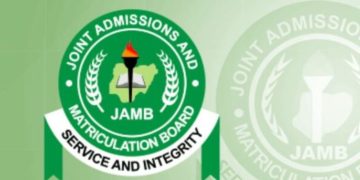
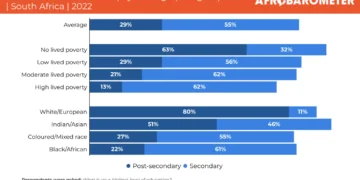

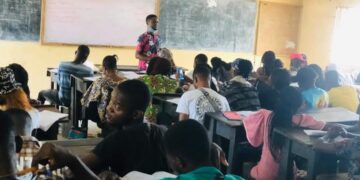







































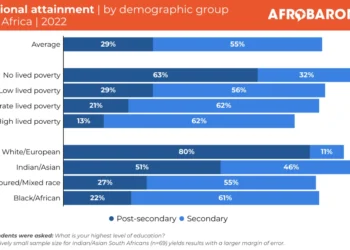

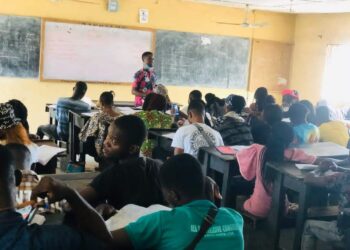

 EduTimes Africa, a product of Education Times Africa, is a magazine publication that aims to lend its support to close the yawning gap in Africa's educational development.
EduTimes Africa, a product of Education Times Africa, is a magazine publication that aims to lend its support to close the yawning gap in Africa's educational development.

